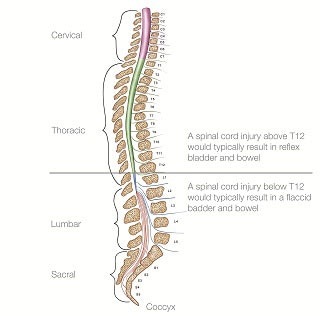
Neurogenic bowel can be described as slow movement of stools, constipation, bowel leakage, and difficulty emptying the bowel. Control of the external anal sphincter muscles may also be disrupted, increasing the risk of bowel accidents
There are two main types of neurogenic bowel dysfunction:
- Reflex bowel
- Flaccid bowel
Reflex bowel
Reflex bowel causes loss of the ability to feel when the bowel is full. Although the anal sphincter muscle (the muscle that keeps the anus closed) remains tight, it will open on a reflex basis when the rectum becomes full and, therefore, the bowel can empty at any time unless appropriately managed. Reflex bowel can occur when the spinal cord is damaged above the T12 level.
Flaccid bowel
Flaccid bowel is when the anal sphincter muscle (that normally keeps the anus closed) becomes relaxed and stays open, often leading to accidental emptying of the bowel. Flaccid bowel is generally caused by damage below the T12 level.
One cause of neurogenic bowel is spinal cord injury (SCI). The impact on bowel function depends on the level of spinal cord injury and where the damage occurs (as mentioned above).
Other possible causes of neurogenic bowel include multiple sclerosis, Spina bifida and Parkinson’s disease.